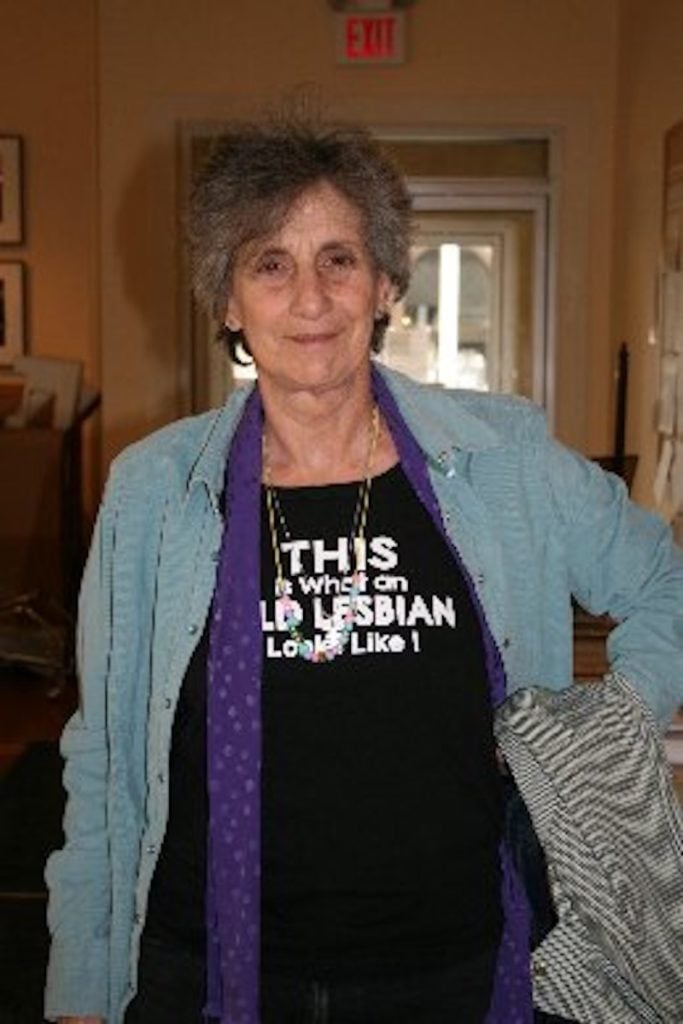Alix Dobkin, the groundbreaking and outspoken, lesbian-feminist folk singer and songwriter, who kicked open the closet door, died Wednesday due to complications from a brain aneurysm and stroke.
She was 80.
Dobkin’s daughter, Adrian Hood, and her son-in-law, Chris Lofaro, who were at her side when she died, shared the news on Caring Bridge.
“Alix came home last Saturday night, and was resting comfortably with great care from a hospice team, as well as from family and friends. She faded out with the grace and strength she showed all through her amazing life. In the early morning hours, she died peacefully with Adrian and Chris by her side.”
Dobkin, who lived in Woodstock, New York, suffered a brain aneurysm April 29 and was admitted to the Westchester Medical Center. During surgery to treat the brain aneurysm, Dobkin had a stroke. She remained sedated after surgery, and later placed on life support. Dobkin was taken off life support May 11 and returned home Monday.
Kicked open the closet door
Dobkin was a women’s music pioneer who kicked open the closet door 20 years before k.d. lang.
A New York City-based folk singer-songwriter in the 1960s and ’70s, Dobkin advocated for lesbians, women-only meetings, and independent thinking. Living in Manhattan’s East Village, Dobkin was supported and embraced by the enclave’s folk scene and feminist and lesbian communities.
As a result, in 1972, prior to the release of her 1973 debut album, “Lavender Jane Loves Women,” Dobkin, then 32, came out. Dobkin recorded the album with the band Lavender Jane.
On her website, Dobkin said the album was “the very first album by, for and about Lesbians in the history of the world. From then until now, I have focused on the lives, concerns and perspectives of women who love women.”
“I’m addicted to uniqueness and originality. I knew my coming out would be important and significant,” Dobkin told this reporter during a 2010 telephone interview from her Woodstock home. “It was a message. It was going to let lesbians all over the world know they are not alone.”
“Lavender Jane Loves Women” was a groundbreaking album, and Dobkin’s public proclamation of being a lesbian had no negative consequences, she said.

Alix Dobkin, the outspoken, lesbian-feminist folk singer and songwriter, who kicked open the closet door, died Wednesday due to complications from a brain aneurysm and stroke. She was 80. Photo: Gene Knapp.
Dobkin followed that release with six other albums, including 1975’s “Living with Lesbians,” 1980’s “Xx Alix,” 1986’s “These Women” and 1998’s “Living with Lavender Jane,” a re-release of her first two albums.
“As the last remaining member of the ultra-lesbian band Lavender Jane, I feel it will be my duty for the rest of my life to keep the legacy of Alix and Kay Gardner alive, without question two of the most influential women in the 50-year history of women’s music,” Toni Armstrong Jr., publisher of Hotwire: The Journal of Women’s Music and Culture told the Windy City Times.
“It is important to remember that starting in the 1970s Lavender Jane used musical and lyrical machetes to cut through the forests of misogyny and pervasive anti-lesbian culture,” Armstrong Jr. said. “Alix in particular was relentless in her insistence that we say, sing and celebrate the word lesbian.”
Wide Eyes Open Palms serves gourmet coffee for feminists, queer community
Being the first self-identified lesbian musician – Spin magazine called her a “womyn’s music legend” – is only the beginning of Dobkin’s story. Dobkin chronicled her equally fascinating pre-“Lavender Jane Loves Women” days in her 300-page memoir, “My Red Blood: A Memoir of Growing Up Communist, Coming Onto the Greenwich Village Folk Scene, and Coming Out in the Feminist Movement,” that was published in 2009.
Early years
Dobkin was born Aug. 16, 1940, in Philadelphia. She grew up in a Communist family where she rubbed elbows with Paul Robeson and came under surveillance by the FBI. In 1956, at the height of the McCarthy witch hunts, Dobkin, then 16, joined the Communist party and her parents quit.
Dobkin also matured as a devotee of folk music, falling under the spell of renowned musicians Lead Belly and Pete Seeger, among others.
Dobkin met her husband, Sam Hood, at the New York City folk club The Gaslight Cafe. In 1970, they opened The Elephant, a folk venue in Woodstock. Their daughter, Adrian, was born the same year.
The couple returned to New York City, and shortly thereafter, Dobkin discovered she was a lesbian, divorced Hood, and fell in love with radio producer Liza Cowan. They moved in together, along with 11-month-old Adrian.
Dobkin achieved her first acclaim as a singer-songwriter when she arrived on the burgeoning folk music scene of Greenwich Village. Dobkin met the up-and-coming Bob Dylan, John Sebastian, Buffy Sainte-Marie and Flip Wilson, among many other rising luminaries.
When Dobkin joined a women’s consciousness-raising group, her music had overt feminist dimensions and she came out.
‘My Red Blood’
But years of living under government surveillance motivated her to pen “My Red Blood.”
“One of the reasons I wrote the book was to exploit my 2-inch thick FBI dossier and extract quotes for promotion of the book,” said Dobkin, who requested her file in 1983 under the Freedom of Information Act.
But the paramount reason Dobkin wrote the memoir was to document her being an eyewitness to the social, cultural and political history of the 1940s, ’50s and ’60s.
“The book is a history lesson,” Dobkin said. “Those times are ancient to our children and grandchildren, but they shaped who we are today.”
At the time, Dobkin said her songwriting career was ancient history to her. She enjoyed small tours around the county to perform her old songs, but said she wouldn’t record any new material.
“I haven’t written a song in about 20 years,” Dobkin said. “I lost interest. I’ve written my songs. I don’t really miss it. I guess my memoir sucked up all the creativity.”
